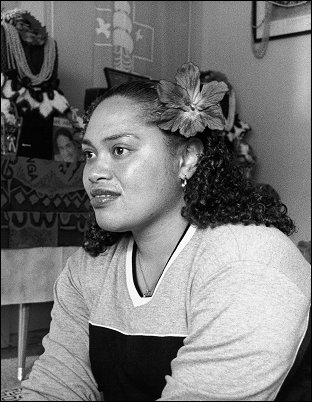Teururai

Photograph, John Owens.
I loved growing up in the Cook Islands. It was a really relaxed and easy life with no hassles. We didn’t have to worry about someone breaking into our home or being out alone at night. If we missed the school bus we just walked and there was always someone who was walking the same way. On Saturday afternoons and Sundays the shops closed and everything was very quiet. I really miss that life.
In 1991 my father was asked to come to Melbourne to start a congregation in Clayton for the Cook Islands Christian Church. My mother, brothers and little sister all came to Melbourne with him while I went to New Zealand to study.
I studied in New Zealand for four years but I found it really hard being away from my family. I started drinking and smoking even though I wasn’t brought up that way. I saw myself slipping and I knew I had to stop. I wanted to live the way I was brought up. I told my father I couldn’t live without the family and made the decision to come to Melbourne. In 1995 I dropped my studies and came over here to help my parents who were finding it hard to care for my two brothers and my little sister as well as work.
When I arrived in Australia it was so good to be back with the family again. As the tears poured out I told my mum not to do that to me again because I couldn’t stand being away from everyone. I just wasn’t myself in New Zealand.
My first impression of Australia was that it was always on the go. In New Zealand I lived in a quiet area but when I came here there were trucks and cars going up and down the street all the time. There was so much going on.
At the beginning of 2000, my parents and little sister went back to the Cook Islands to work for the church and I stayed in Melbourne to look after my two brothers who are still studying. When my father left he gave us a hug, then grabbed his bag and walked straight out the door. He didn’t turn around because he knew how painful it was for us. It took me nearly two months to recover. Whenever he phoned I could hardly talk for crying.
I thought I would skip church when my parents left but I haven’t missed it once. It is the most important thing of the week. The minister preaches in English and Cook Island Maori. He reads the Bible and gives the sermon in both languages so that the kids will understand but he says the prayer only in Maori. On the first Sunday of the month we have a Passover. I call it White Sunday because we all wear white. The boys wear white shirts, black necktie and white trousers or black trousers if they can’t afford white ones. The ladies also wear white and put their hair up but have no flowers in their hats.
At home we speak both Cook Island Maori and English. When I am calm I mix English and Maori but if I am angry I just blast away in my own language. My brothers know I am angry then.
The toughest part about living here is money. I have permanent work in the tea factory so I pay the rent and the phone bills while my brother, who only has casual work, pays the gas and electricity bills. I am working my butt off to pay the rent. I’m looking for another job during the day as well as my night shift at the factory. My boss knows we are struggling because I always bite at any overtime he offers.
Sometimes, during the week we just have cereal or sandwiches to save money and then we will cook something nice on Sunday. My brothers don’t mind because they know how hard it is.
I love living in Clarinda. I feel safe here. It’s close to the milk bar, to the shopping centre and the doctor. If I had to move anywhere it would have to be somewhere around Clarinda. On warm summer nights we go outside and sit on the footpath and enjoy the breeze. Sometimes the cars flash their high beam lights as they go past on Centre Road.
